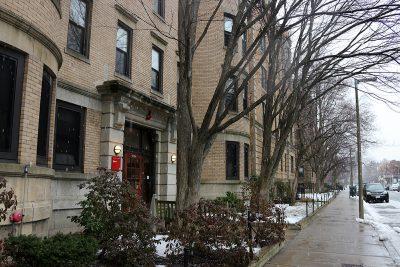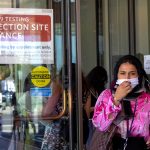
The Boston University Police Department arrested a suspect in connection with recent South Campus break-ins Friday night. The intruder is believed to be the same person who broke into South Campus residences at 96 Mountfort St. and 6 Buswell St. in February.
The suspect had “piggybacked” into the 728 Commonwealth Ave. residence by following a student who had just swiped into the building.
BUPD Chief of Police Kelly Nee said once the student entered the residence, he called BUPD after noticing the man behind him, and the person was apprehended in the building shortly after carrying a pocket knife and hypodermic needles.
“I do think that having the extra patrol in the area allowed the police to get there so quickly,” Nee said, “before this person had a chance to get out of the building.”
Nee said she urges students to remain on guard — investigators are still working to prove the same suspect is responsible for the first two burglaries as well as reported indecent exposure.
“I don’t want people to think the case is solved and everything is great,” Nee noted. “Being mindful of your environment, avoiding letting someone piggyback. If it’s unavoidable, just call us right away and lock the doors when you’re inside the buildings.”
Nee said the identity of the perpetrator would not be released until his arraignment. Nee also said the student who placed the call did everything that was asked of students if they notice suspicious activity.
“Don’t let people piggyback, but if somebody does the same way that this one happened, just call us,” she said. “We don’t want people to confront a stranger in their building.”
BU spokesperson Colin Riley said the incidents were “very disconcerting.”
“It’s something that keeps you awake at night,” he said, “and to know that the likely suspect or suspects involved have been apprehended and be dealt with should give some comfort.”
Riley said he applauded the student who called BUPD as well, noting he had followed the recent guidelines issued from Residence Life on what to do in the event of such situations.
“We indicated the type of behavior that we are concerned with which provided access to student residences or other university buildings,” Riley said. “If you see something, say something.”
Zahra Marhoon, a senior in the College of Engineering and resident of 722 Commonwealth Ave., said she witnessed the arrest taking place next door to her dorm building Friday night.
“I was on my way to get tested at [808 Commonwealth Ave.] and there were a lot of police here,” she said. “There were about five police cars and they were at 728 Comm Ave.”
Marhoon said she still feels “relatively safe” given that she has not been personally affected by any incidents, but wishes other students would be more careful to avoid piggybacking.
“I now pay more attention if I see someone coming in after me,” she said. “I shut the door and have them swipe their ID.”
She added while she has concerns, the incidents have not affected her perception of safety on campus.
“I don’t feel threatened overall,” Marhoon said. “It was just a little shocking to see the guy, but I still feel relatively safe.”





Last year, the University raised $1.85 billion in donations. Those funds have been invested into unspecified “endowed scholarships, endowed professorships, endowed programmatics, capital projects, and sponsored programs.” While this information is available through a Bostonia publication, the writing uses a great deal of buzz words that draw the big red circle around a lack of transparency at Boston University.
With this in mind, it should be no surprise that the University hasn’t modernized its housing facilities with regards to security. We have no way of knowing if the funding is available or if it is potentially being allocated to improving student safety.
At dormitories at Northeastern University, and other Boston area institutions, all student living spaces have digital locks that require either a swipe of the student’s ID card, entry of a pin code, use of an app, or a combination of these safeguards. In any case, the doors lock automatically once closed, and can be unlocked manually from the inside.
The BU Student Villages are a recent construction, and yet, they also lack these locks. Arguably, due to a lack of these systems, a student was sexually assaulted in Student Village 2 in 2015 as reported by Naba Khan in the Boston Globe. The perpetrator had no authorization to be in the building, and yet, was able to not only make it inside a student’s apartment, but into a student’s bedroom.
These incidences in South Campus could have been voided, and could continue to be avoided, if the University installed such digital lock systems across campus. South Campus locks are changed on a regular basis— they would not have to be changed if digital lock systems were implemented. It would be as simple as resetting a code barring physical damage to the locks themselves.
Given all of these aforementioned incidents, the question for BU Administration and Facilities now remains: Will the University explore the option of installing electronic locks across campus, and more importantly, will they actually do it?